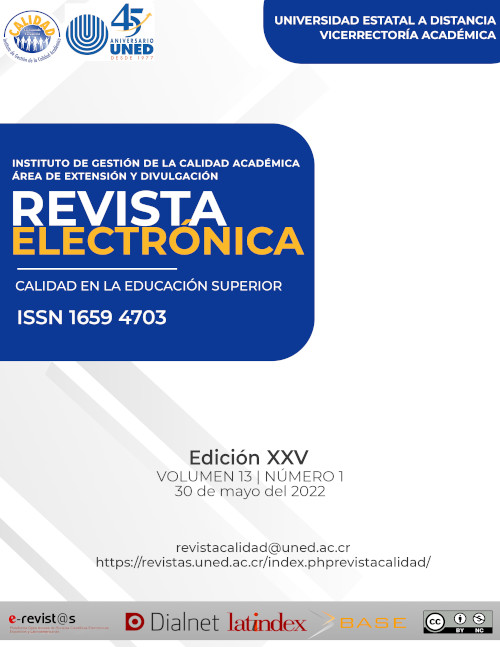Theoretical criteria in and for diversity that underpin continuous teacher training in chilean early Childhood Education
DOI:
https://doi.org/10.22458/caes.v13i1.3014Keywords:
Theoretical Criteria, Ongoing Teacher Training, Early Childhood Education, DiversityAbstract
Education in Chile calls for a look at diversity, understanding it through categories, variety and distinction. Thus, continuous training has given rise to the need to formulate theoretical criteria regarding Early Childhood Education in and for diversity. The methodology of this study adopted a qualitative approach of the interpretative-participatory field type, with the support of Grounded Theory and its Continuous Comparative Method. The techniques used were in-depth interviews, and participant observation. The key informants were five educators with more than five years of work experience in early childhood education in the Region of Los Lagos, Chile. The findings were obtained from the interpretation of the empirical situations. In this way, dialectics and actions of the educators were clarified, with information about knowledge and experiences orientated towards diversity. It is concluded that the theoretical criteria will allow the teacher training to be successful, in order to develop competences to achieve the attention of diversity.
References
Alfaro, S., Ansión, R. y Tubino, F. (2008). Ciudadanía intercultural. Conceptos y pedagogías desde América Latina. Recuperado de https://www.pucp.edu.pe/idhal/publicacion/ciudadania-intercultural-conceptos-y-pedagogias-desde-america-latina/
Amezcua, M. (diciembre, 2015). La entrevista en profundidad en 10 pasos. Index de Enfermería, 24(4), 216. DOI: https://dx.doi.org/10.4321/S1132-12962015000300019
Arancibia., M., Miranda., C, Pérez., H. y Koch, T. (junio, 2008). Necesidades de formación permanente de docentes técnicos. Estudios pedagógicos, 34(1), 7-26. DOI: https://dx.doi.org/10.4067/S0718-07052008000100001
Cerrón, W. (julio, 2019). La investigación cualitativa en educación. Horizonte De La Ciencia, 9(17), 1-8. Recuperado de https://revistas.uncp.edu.pe/index.php/horizontedelaciencia/article/view/219
Donoso, T. y Rodríguez, M. (2007). El análisis de las competencias genéricas de profesionales de la psicopedagogía en activo: un ejemplo de formación permanente. Revista Portuguesa de Pedagogía, 41(3), 77-99. DOI: https://doi.org/10.14195/1647-8614_41-3_4
Fernández, B. (2018). Comprensión didáctica del currículo como espacio público. Revista Perspectivas, 3(1), 59-70. Recuperado de https://revistas.ufps.edu.co/index.php/perspectivas/article/view/1424/1656
Gardner, H. (1996). Inteligencias múltiples. Barcelona: PAIDOS
Glaser, B. y Strauss, A. (1967). El descubrimiento de la teoría fundamentada. Chicago: Aldine Press.
Grabivker, M., Marholz, G., Castro, L., Manzo, L., Lozano, M., Antinao, C. y Pakomio, T. (2009). Orientaciones curriculares para una educación parvularia intercultural. Chile: CONADI-CEIP.
Hidalgo-Durán, G (noviembre, 2019). Desarrollo de competencias tecnológicas: reto fundamental para los profesores universitarios costarricenses. Calidad en Educación Superior, 10(2), 34-52. Recuperado de https://revistas.uned.ac.cr/index.php/revistacalidad/article/view/1924.
Ministerio de Educación. (2005). Informe comisión nacional de formación inicial docente. Chile: Ministerio de Educación.
Ortega, S. (2011). Profesores para una educación para todos. Chile: CEPPE
Pandit, N. (enero, 1996). La creación de la teoría: una aplicación reciente del método de la teoría fundamentada. The Qualitative Report, 2(4), 1-15. DOI: https://doi.org/10.46743/2160-3715/1996.2054
Pugh, G. y Lozano-Rodríguez, A. (julio, 2019). El desarrollo de competencias genéricas en la educación técnica de nivel superior: Un estudio de caso. Calidad en la educación, 50(1), 143-179. Recuperado de https://www.calidadenlaeducacion.cl/index.php/rce/article/view/725/545
Ruíz, C. (2002). Instrumentos de investigación educativa: procedimientos para su diseño y validación (2a.ed). Venezuela: CIDEG.
Strauss, A. y Corbin, J. (2002). La investigación cualitativa. Técnicas y procedimientos para desarrollar la teoría fundamentada. Colombia: Contus.
Vargas, M. (2010). Diseño curricular por competencias. México: Centro de Estudios Superiores del Estado de Sonora.
Downloads
Published
How to Cite
Issue
Section
License
Esta revista provee acceso libre inmediato a su contenido bajo el principio de que hacer disponible gratuitamente la investigación al publico, lo cual fomenta un mayor intercambio de conocimiento global.
